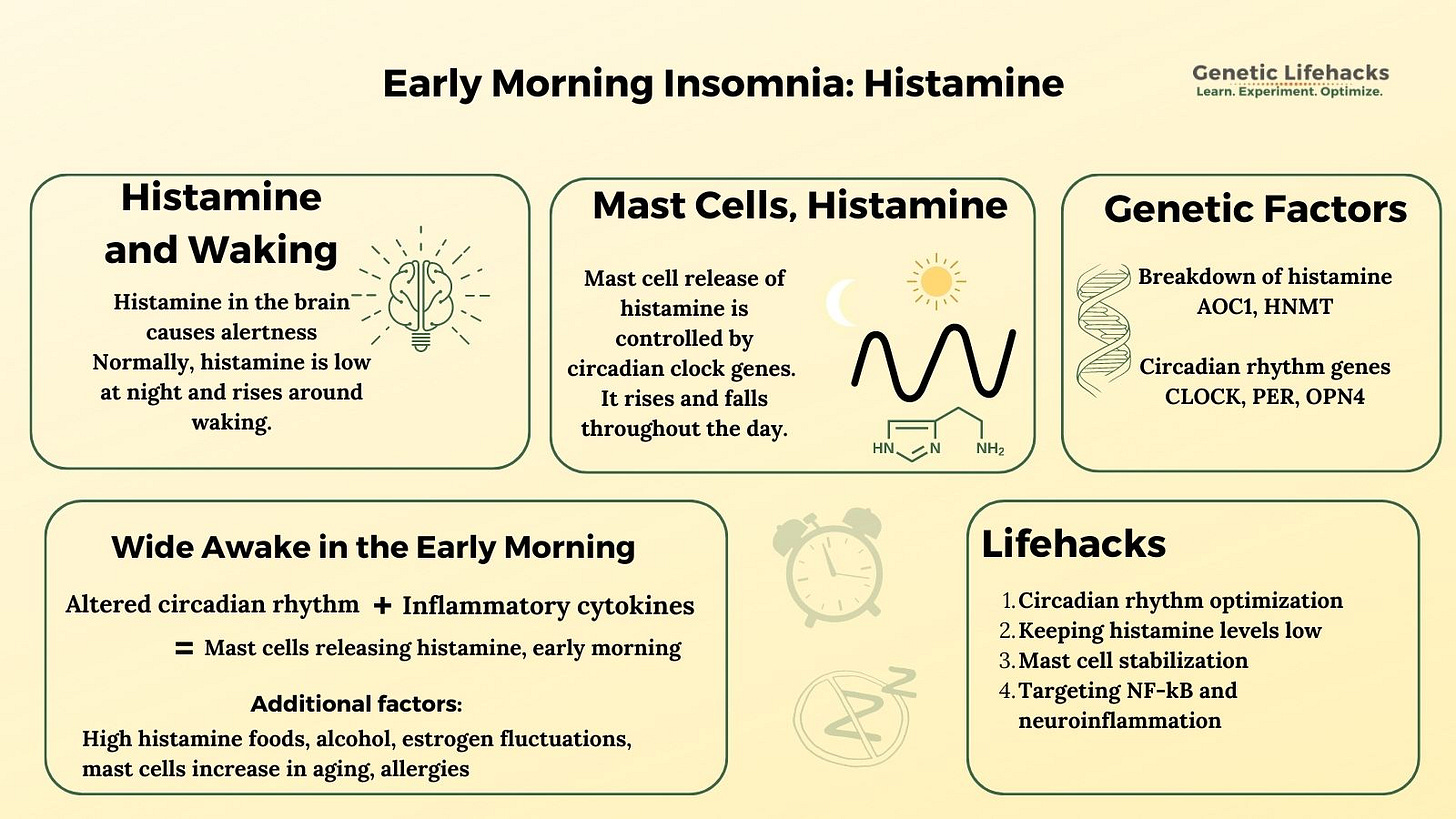Waking up at 3:30 in the morning...
How histamine, circadian rhythm disruption, and inflammatory cytokines cause early morning insomnia.
Hi there,
I find it fascinating how one molecule can be used for so many different purposes in the body. Histamine is one example. While we often think of histamine in terms of allergies and itchy hives, histamine is used in many different ways in the body.
In the brain, one type of neuron is called histaminergic neurons. These neurons are activated by histamine and regulate the sleep-wake cycle, appetite, alertness, and cognition.
My latest article is about the alerting - or awakening - aspects of histamine.
Many of us have experienced the sleepiness brought on by taking Benadryl (diphenhydramine) for an allergic reaction. Diphenhydramine can cross the blood-brain barrier and block histamine receptors in the brain, causing drowsiness or decreased alertness.
Histamine is produced in the brain and throughout the body at basal levels throughout the day and night. The level of histamine production is controlled by circadian clock genes, and we naturally have peaks and valleys of histamine over the course of 24 hours. A peak in histamine levels usually occurs just before you normally wake up. This is one reason why you feel alert in the morning.
What happens when histamine is released too early due to circadian disruption? Well, this could be why you find yourself staring at the clock at 3:30 in the morning, wondering why your brain is awake when you want to be asleep.
A new research paper on the topic shows that circadian disruption, along with elevated inflammatory cytokines, are intertwined with histamine release from mast cells.
The article below details how all of this might work together to cause early awakening insomnia. I also include genetic variants that may make you more sensitive to histamine from food and circadian disruption.
Gratefully yours,
Debbie
New article -- open to non-members for this week only.
Histamine, Mast Cell Activation, and Early Morning Insomnia
Key takeaways:
~ Histamine levels rise and fall throughout the day according to the circadian rhythm of mast cells.
~ In the brain, histamine acts as a neurotransmitter and is associated with wakefulness.
~ Neuroinflammation plus altered circadian rhythm of histamine release may be a cause of early morning insomnia.
~ Genetic variants in circadian rhythm genes may affect your response to environmental factors, such as light at night, that alter your circadian rhythm.
~ Genetic variants in histamine-degrading enzymes can increase your histamine levels.
What I've been reading:
1. Remains found in China may belong to third human lineage
Paleontologists in China have found remains that they date to 300,000 years ago. The jawbone, skull, and leg bones have some unique features. The scientists think they are from an ancestor of modern humans that is related to the Denisovians and Homo erectus but is closer to modern humans.
2 .BPA and insulin resistance
BPA is a ubiquitous environmental toxicant, found in plastic bottles, thermal printed receipts, and half the foods that we eat.
This paper hypothesizes that BPA impairs glucose uptake by impairing insulin signaling and GLUT4 translocation in skeletal muscles.
3. Engineered probiotic developed to treat multiple sclerosis
Researchers have found that lactate acts as a brake on the immune response, which is lacking in autoimmune diseases. They have created a probiotic using synthetic biology that increases lactate production.
Here's the study in Nature if anyone wants to read it. It seems like the mechanism here could be important in long Covid -- increased lactate in dendritic cells boosts HIF-1a and another molecule that controls T cells.





